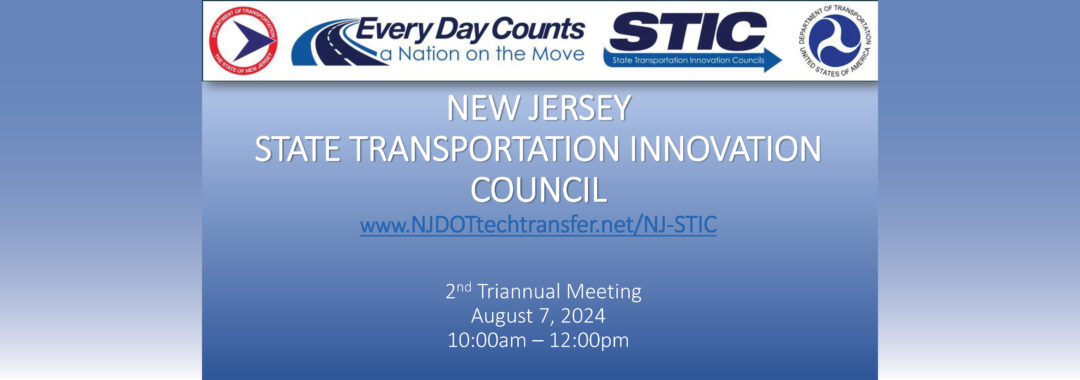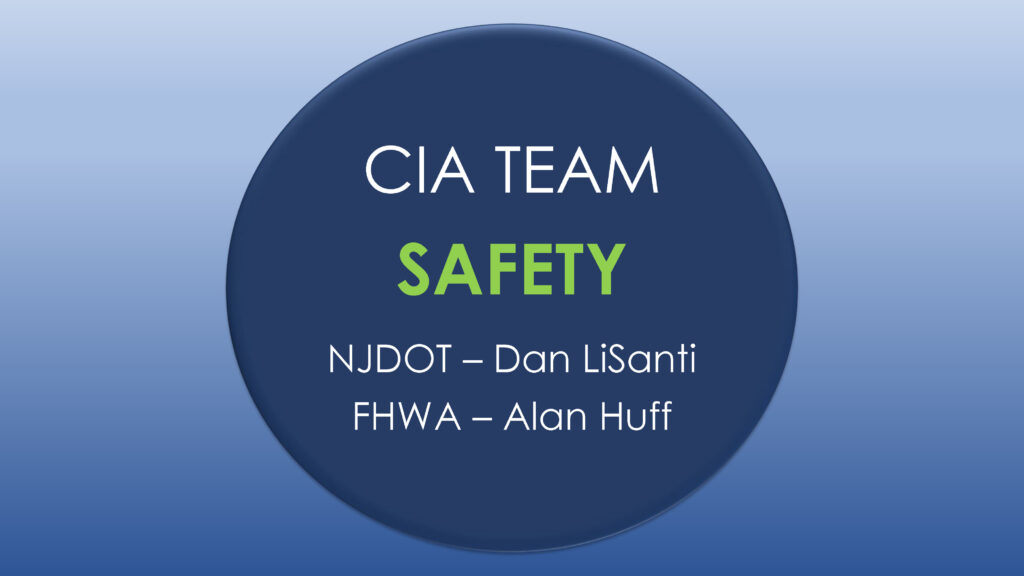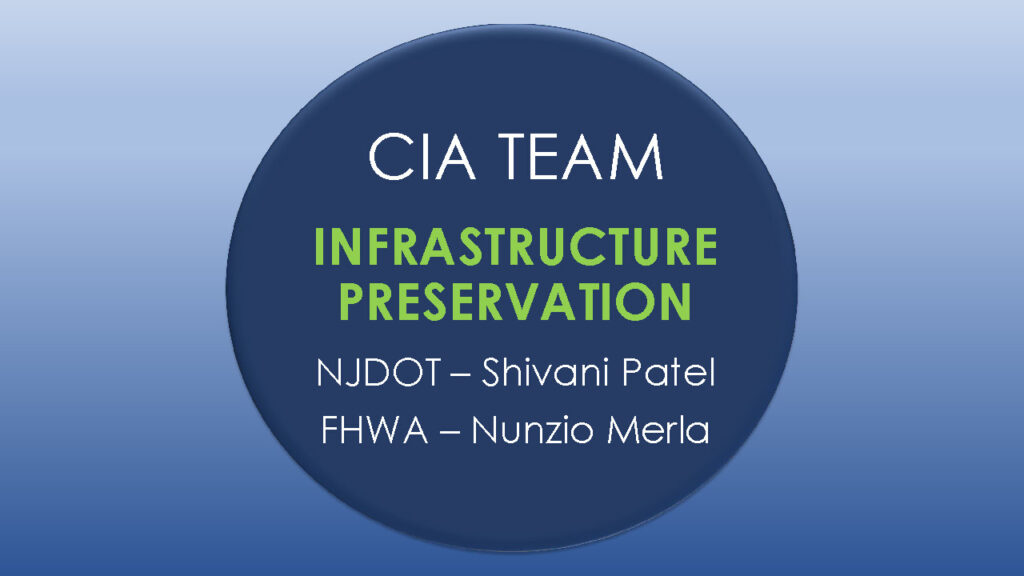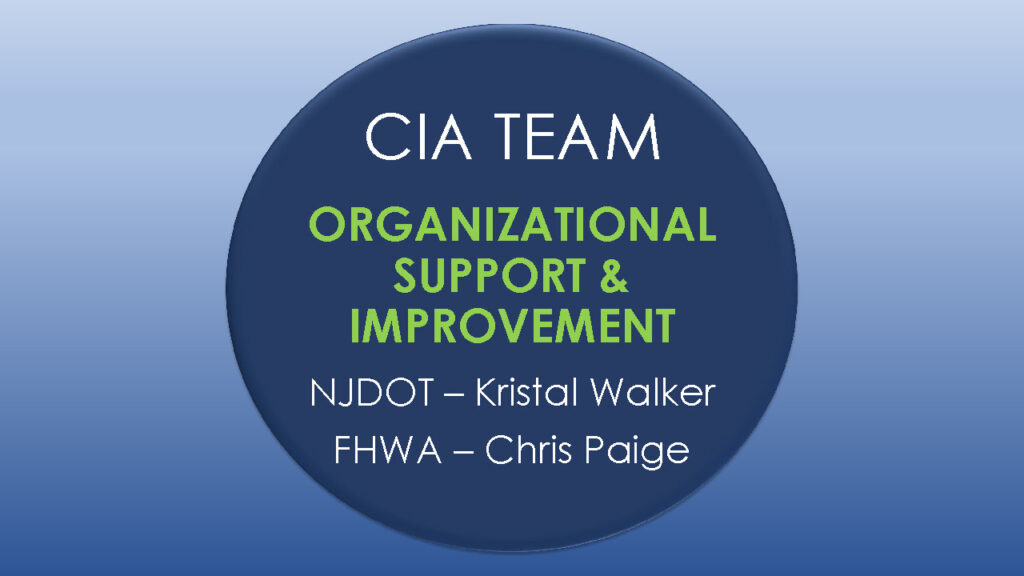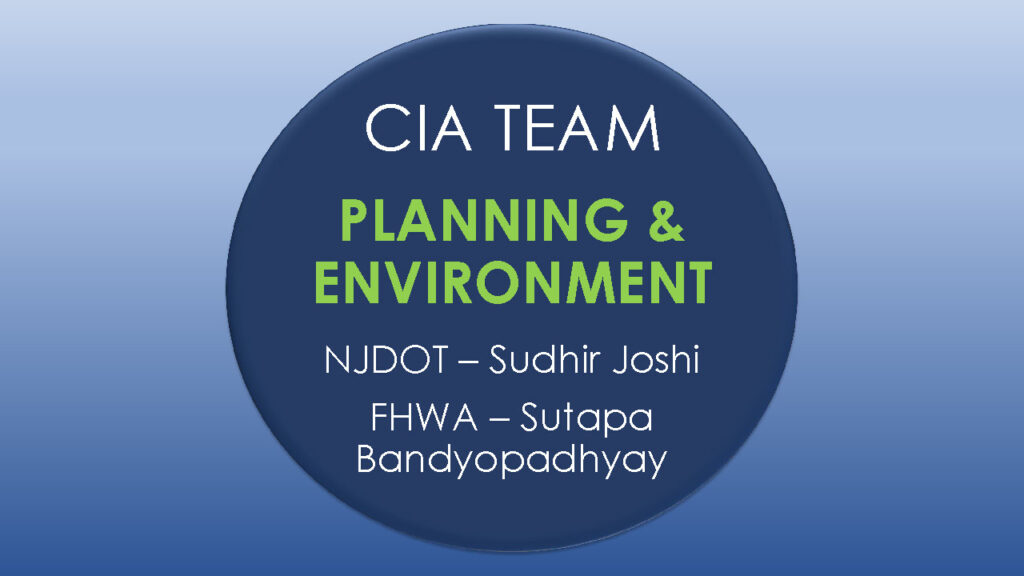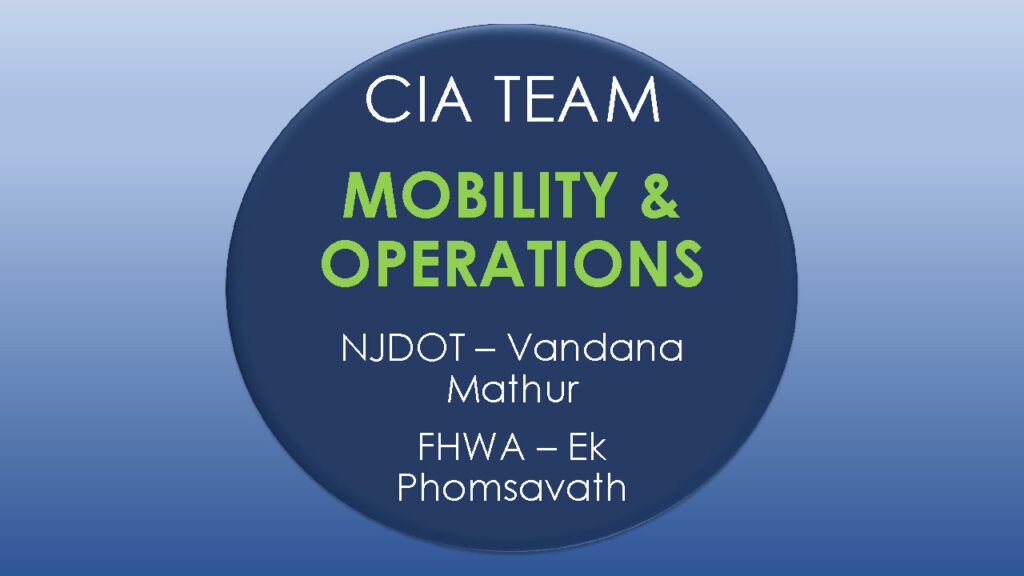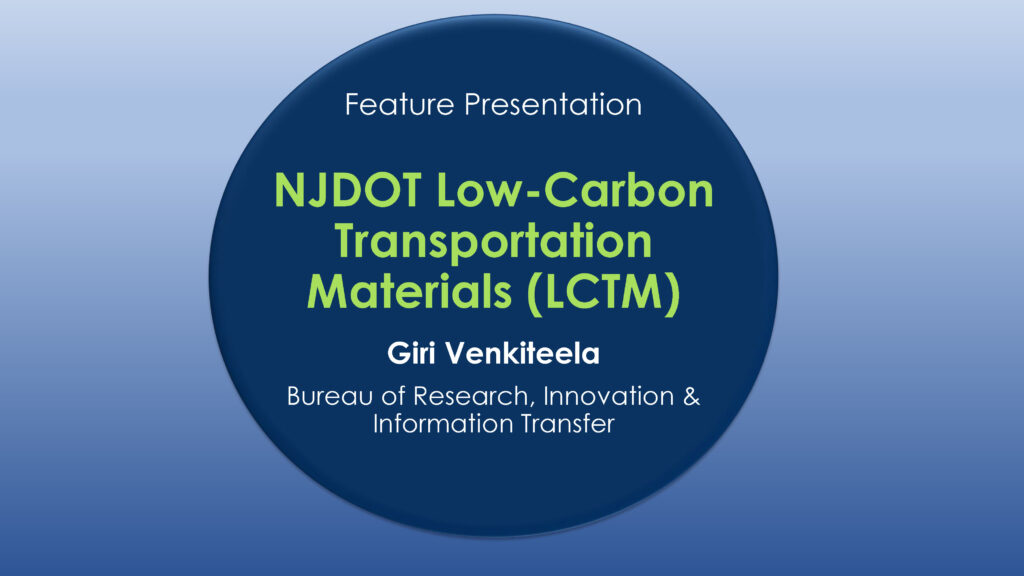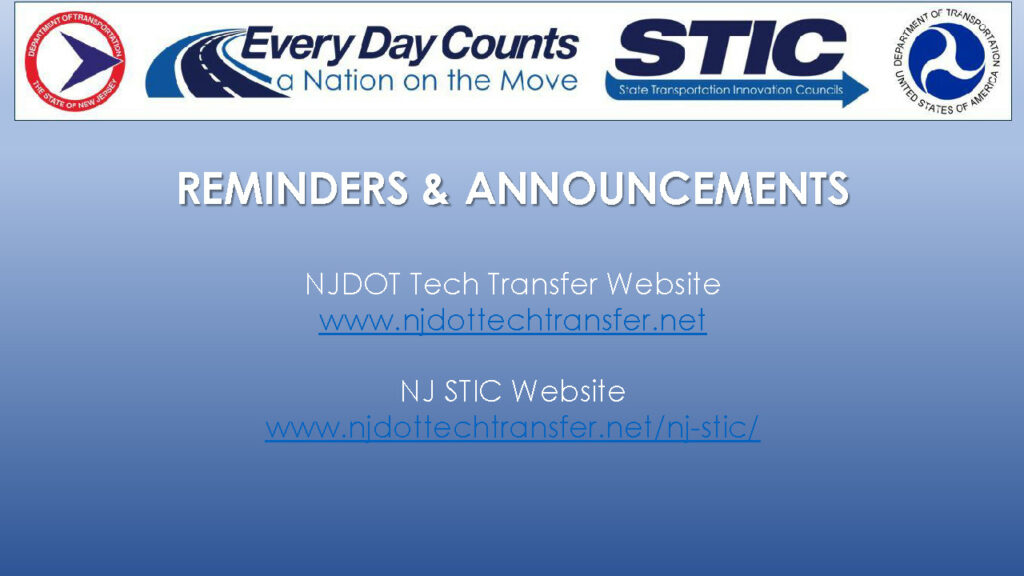The NJ State Transportation Innovation Council (NJ STIC) virtually convened for its second Triannual Meeting of 2024 on August 7. The Core Innovation Area (CIA) Teams reported on their progress towards Every Day Counts Round 7 (EDC-7) goals. Those in attendance heard featured presentations on a recent Low-Carbon Transportation Materials Grant Application and two AASHTO Awards given to NJDOT for innovative High Value Research Projects.
Welcome Remarks
Eric Powers, Assistant Commissioner NJDOT Statewide Planning, Safety & Capital Investment and Megan Fackler, Director of Statewide Planning, greeted those in attendance and opened the second Triannual Meeting of 2024. Eric Powers shared his excitement regarding the featured presentation on low carbon transportation materials while Megan Fackler shared the positive experience, she has had thus far with STIC meetings in her new role. Amanda Gendek then gave an overview of the day’s agenda which had been distributed in advance of the meeting.
FHWA Updates
Christopher Paige, Innovation Coordinator and Community Planner at the FHWA NJ Division Office, provided FHWA updates. Mr. Paige updated the group regarding a recent strategic workforce development peer exchange that he attended along with others from the NJ STIC that was hosted by the New York State Department of Transportation (NYSDOT) in Syracuse, NY. He also reminded the audience that the STIC incentive grant applications are due by August 9, 2024. Additionally, Mr. Paige announced that CIA Teams submit their next round of EDC-7 progress reports by November 8th, a deadline that is before the next Triannual Meeting in December.
Core Innovation Areas (CIA) Updates
The Core Innovation Area (CIA) Team leaders shared updates on their progress toward achieving the deployment goals for their respective innovative initiatives. CIA Team leaders from the NJDOT and FHWA discussed EDC-7 initiatives under the five CIA Teams: Safety; Infrastructure Preservation; Mobility and Operations; Organizational Support and Improvement; and Planning and Environment. Each team’s presentation offered insights into their ongoing projects and highlighted key implementation activities, accomplishments, and challenges they have encountered so far in meeting the deployment goals for the innovations.
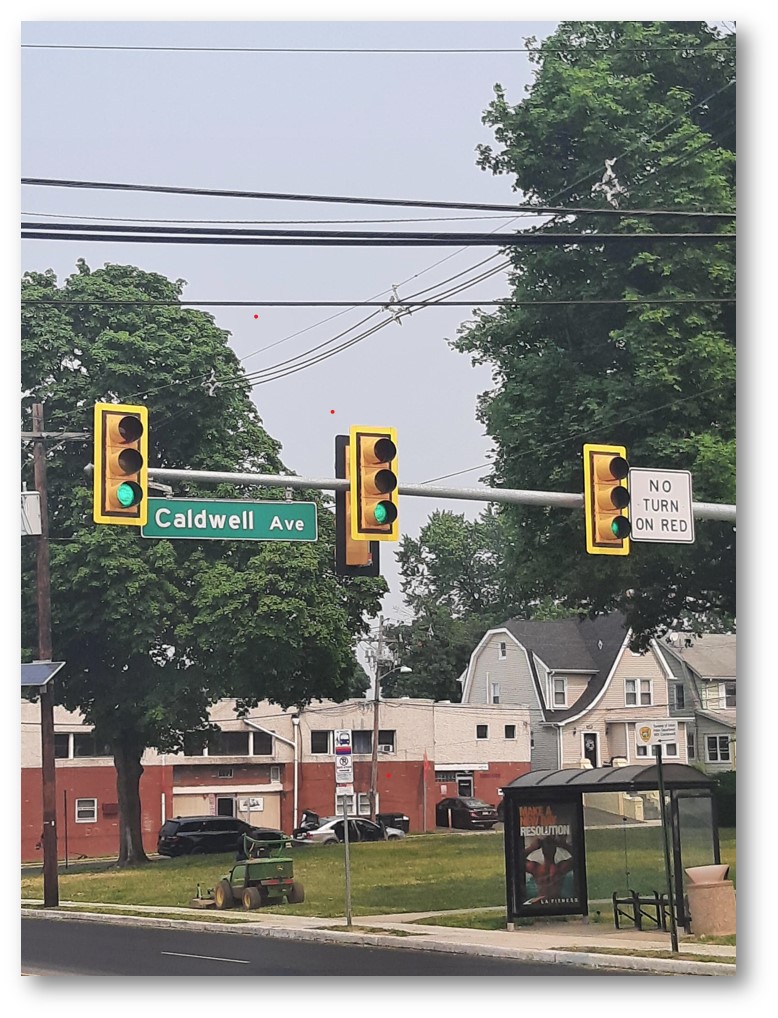
Several accomplishments and challenges were noted on select innovative initiatives, including:
Nighttime Visibility for Safety. The consultant designer is coordinating with fabricators on the feasibility of manufacturing the designed steel traffic signal poles and mast arms. The basis of design for aluminum poles, mast arm, and foundation has been reviewed by NJDOT, and comments provided to design consultant.
Enhancing Performance with Internally Cured Concrete. The guide specifications for the High Performance Internally Cured Concrete (HPIC) have been finalized and incorporated in the special provisions of the Final Design Submission for the first pilot project, scheduled to be awarded in Fall 2024. The pilot project is North Munn Ave. Bridge over Rt. 280, in the City of East Orange Essex County, NJ. The team engaged with Utility & Transportation Contractors Association-NJ to solicit feedback on the draft special provisions. The team also coordinated with Light Weight Fine Aggregate suppliers to ensure the availability of the material for the pilot project and assessed concrete suppliers in the vicinity of the project location for prior experience with supplying internally cured HPIC.
Additionally, team members attended the New York State Peer Exchange on the EPIC2 Initiative in Albany, NY on May 29-30, which provided an opportunity to engage with champions from adopting states as well as with suppliers and contractors on implementation lessons and other topics.
Within the pilot projects program, the team expects to carry out a procurement process to purchase several centrifuge apparatuses for quality control of moisture content of lightweight fine aggregate; the team also expects to update the HPIC specifications to incorporate the centrifuge apparatus.
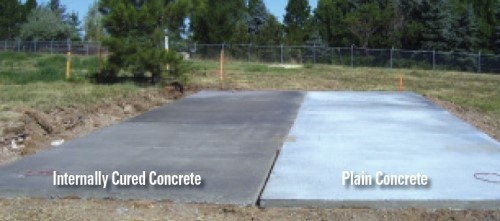
Environmental Products Declarations (EPDs) for Sustainable Project Delivery. NJDOT staff attended the FHWA Climate Challenge & EDC-7 Environmental Product Declarations (EPDs) for Sustainable Project Delivery National Symposium in-person and virtually on June 5-6 in Arlington, VA. Day 1 of the symposium showcased the climate challenge and EDC-7 participant projects and efforts. Day 2, exclusively for in-person attendees, provided an opportunity to continue discussions from the previous sessions and facilitated an exchange of lessons learned among state representatives.
The team is currently comparing specialty mixes to regular mixes. Due to the limited availability of EPDs for specialty mixes, New Jersey must conduct a comparative analysis prior to using Job Mix Formula (JMF) to create its own EPDs for specialty mixes. As part of this process, New Jersey has evaluated its JMF for regular mixes to determine if it aligns with numbers found in industry-level EPDs. Until there is full confidence that New Jersey’s JMF for regular mixes matches industry-level EPDs, the department will refrain from the using the JMF to create EPDs for its specialty mixes.
Greenhouse Gas Reductions in Planning. NJDOT staff have identified carbon reduction categories for transportation project types that are already being implemented statewide to reduce emissions. During the update, an implementation plan and potential next steps activities were discussed, including: rank and score Carbon Reduction (CRP) and GHG Emissions Reduction Projects based on criteria to be determined; inclusion of the CRP-funded projects in the STIP to justify and inform use of the CRP funds; use GHG impacts as a mandatory STIP project selection criterion to incorporate the project-level GHG reporting; update the CRS every two years to align with the STIP; evaluation of CO2 impacts of CRP funds; implementation of the FHWA-approved Carbon Reduction Strategies in the STIP; and sharing data with MPOs and other Stakeholders.
Next-Generation TIM – Technology for Savings Lives. The team reported on the deployment of TIM Technologies including light towers on NJDOT incident management trucks, light flares at incident scenes, and the use of DriveWyze to provide real-time notifications of queuing and slowdowns to truck drivers, and alerts targeted at keeping trucks out of the left lane on three-lane roadways.
Feature Presentation 1: Low-Carbon Transportation Materials Grant Application
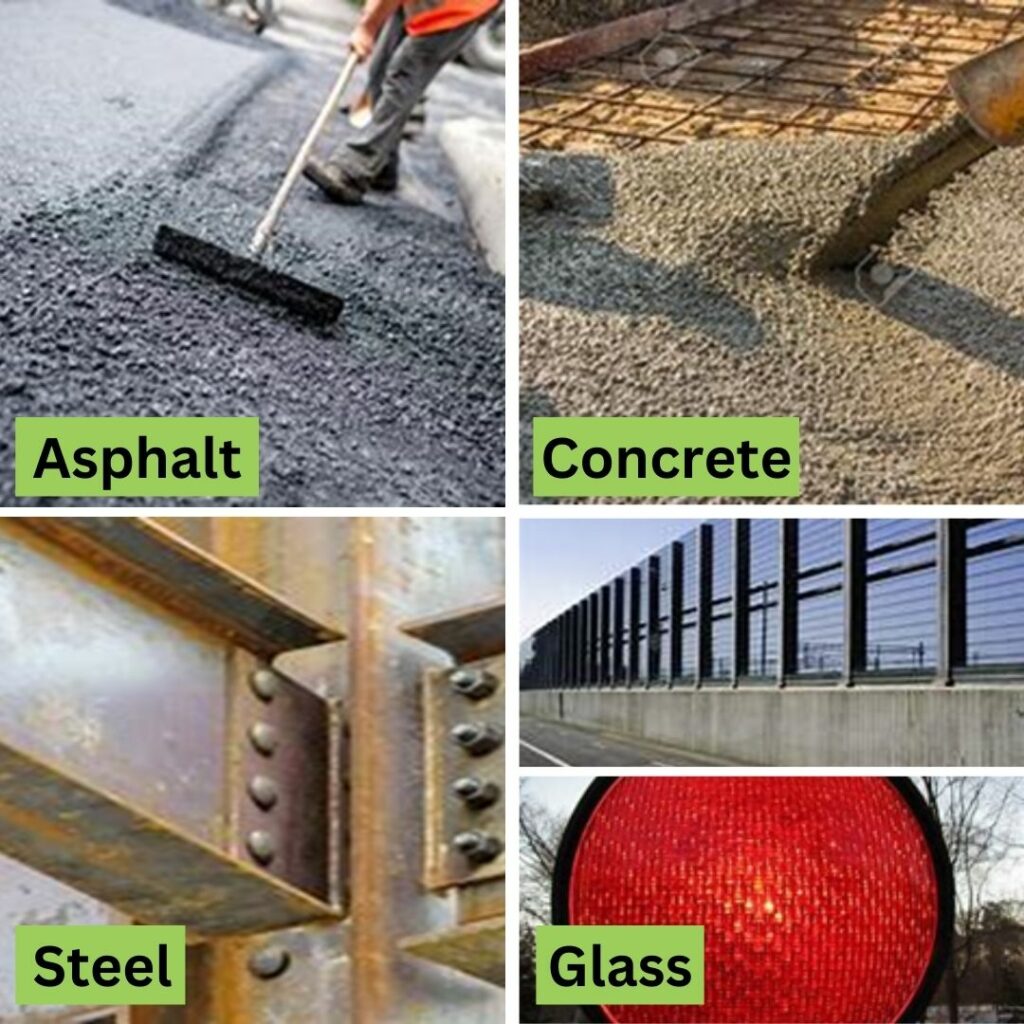
Dr. Giri Venkiteela, Research Scientist 2 in NJDOT’s Bureau of Research, Innovation and Information Transfer (BRIIIT), presented on the NJDOT Low-Carbon Transportation Materials (LCTM) program application, which was submitted to the Federal Highway Administration (FHWA) prior to the June 10th deadline. Similar to other state DOTs, NJDOT is eligible for at least $22 million to support the increased and institutionalized use of low carbon transportation materials on Federal-aid projects. Offered by FHWA, the LCM grant program will obligate funds through September 30, 2026, with availability for expenditure before September 30, 2031.
The grant program’s goals are to increase the use of low-carbon materials, facilitate the use of these materials, promote technology transfer between entities regarding best practices and lessons learned, and encourage state DOTs to develop low-carbon transportation material identification frameworks. Eligible materials categories include asphalt, concrete, steel, and glass – all of which NJDOT is interested in advancing.
If awarded, the LCTM grant will mobilize a University Consortium to undertake a series of tasks, in association with NJDOT SMEs, over several years that will involve the identification of low carbon materials, environmental product declarations (EPDs), testing and specifications development, and technology transfer activities. In Phase 2, pavement and bridge construction projects will be carried forward to demonstrate and adopt the LCTM materials. Ultimately, the project is expected to engage many NJDOT SMEs, Universities and the private sector.
After the presentation, attending participants noted that in early 2023, the state legislature had passed the New Jersey Low Embodied Carbon Concrete Leadership Act (LECCLA) (S-287), a law that went into effect in January 2024. Under the law, concrete producers who provide mixes with a reduced carbon footprint on state-funded projects may be eligible for tax incentives. Under the law, concrete mixes with Global Warming Units below a threshold established by the NJ Department of Environmental Protection (NJDEP) will be eligible for tax credits. Participants suggested that further examination of the program may be warranted to glean what opportunities and lessons may be learned from its recent roll-out and implementation.
Feature Presentation 2: High Value Research Project Spotlight
Amanda Gendek announced that two of NJDOT’s research projects received national recognition from the American Association of State Highway Transportation Officials (AASHTO). Every year, the High Value Research Task Force of AASHTO’s Research Advisory Committee (RAC) holds a national competition to find four “high value” research projects from each of the four AASHTO regions in the country. In 2024, two research projects sponsored and managed by the New Jersey Department of Transportation were recognized nationally with awards.
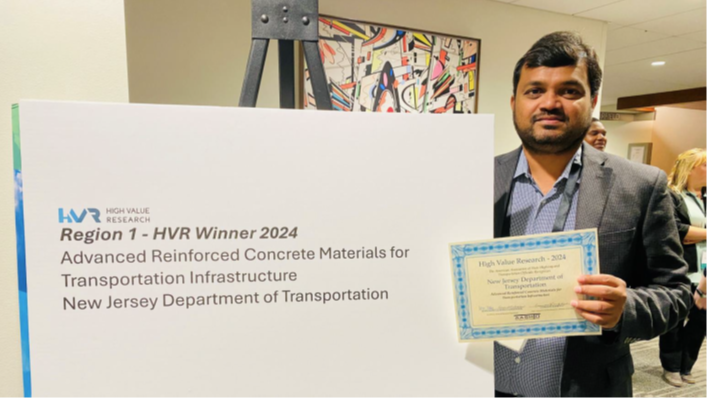
The first project, “Advanced Reinforced Concrete Materials for Transportation Infrastructure,” managed by Dr. Giri Venkiteela, BRIIT, was one of the top 16 projects in the country recognized with this High Value Research award. The project focused on assessing the mechanical properties and long-term durability of reinforced concrete used in transportation infrastructure.
The second project, also managed by Dr. Venkiteela, “Innovative Pothole Repair Materials and Techniques,” was recognized in the Maintenance, Management, and Prevention supplemental category. The project explored several innovative pothole repair techniques using asphalt, including preheating the excavated pothole prior to repair, utilizing hot filling material, and incorporating recycled materials in pothole repair.
Announcements and Reminders
NJDOT Technology Transfer Website Reminder. Attendees were reminded to refer to the NJDOT Technology Transfer website and, in particular, the NJ STIC section. The website is useful for staying up-to-date on NJ STIC activities and developments and for accessing a wide array of NJ STIC content, including an overview of the NJ STIC, the NJ STIC Charter, past meeting summaries, the status of current and past innovative initiatives, NJ STIC Grant Incentive Funding information, and articles and other materials that spotlight innovation and past NJ innovation accomplishments.
NJ Transportation Ideas Portal. Ms. Gendek encouraged attendees to participate in the NJ Transportation Ideas Portal. The portal is open to the public for submissions of future research ideas and implementation studies. The Innovation Advisory Team reviews these proposals for feasibility of future actions. She noted that the portal is always open to new research and innovation idea submissions for consideration for future collaborative efforts and investments. The deadline for submission of research ideas for the next round of funding is December 31, 2024.
104th TRB Annual Meeting. Ms. Gendek announced that registration for the TRB Annual meeting will open in September. The meeting will take place in Washington DC from January 5-9, 2025.
Next Meeting. Amanda Gendek reminded attendees that the third triannual STIC meeting of 2024 will be hosted on December 18th at 10 a.m.
Acknowledgements. The session concluded with expressions of gratitude to the guest speaker, CIA Teams, council members, and implementation teams. Their contributions were recognized as pivotal to the meeting’s success and the council’s ongoing endeavors.
A recording of the NJ STIC 2024 2nd Triannual Meeting meeting is available here. The day’s presentations can be found here and, in the sections, below.

